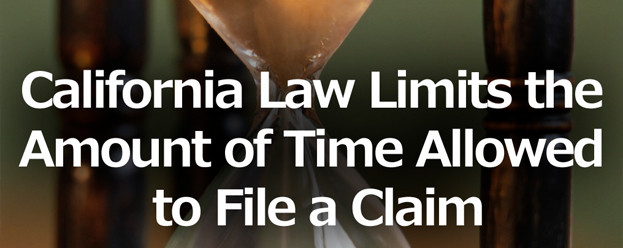Be Careful of California Statute of Limitations to Prevent Time Barred Collection Claims
By : Curtis D. Colaw | Category : News | No Comments
11th Jul 2012

In the State of California, there are specific time limitations on debt collection matters which are generally referred to as “statute of limitations” which can lead to time-barred debts. Normally, the limitations period runs from the date the last payment was due on the debt, the date of the breach or notice of the breach of the obligation or as otherwise specified in the written agreement between the parties.
The normally applied statute of limitations is four (4) years on written agreements and two (2) years on oral agreements. (See California Code of Civil Procedure sections 337 and 339.) However, even oral agreements can be subject to four (4) year limitation periods on open book accounts. Sometimes other statutes apply making the period actually a shorter three (3) year limitation period where the right to collect the debt is based upon a statute. It also may be that an initial oral agreement may actually qualify as a written agreement if the debt is later evidenced by a writing; thus extending the limitations period to four (4) years.
The limitations period may also be extended by mutual agreement of the parties, agreed extensions to pay, where a party moves out of California or where a bankruptcy filing prevents the debt collection attorney from filing the action by the automatic stay of bankruptcy imposed by 11 U.S.C. section 362. There may also be judicial estoppel to claim a statute of limitations defense in certain cases.
Aggressive commercial debt collection attorneys need to be aware of these limitation periods to protect their clients from expired claims and to timely move to file with creditor claims with the court or through an agreed arbitrator. Clients should be made aware of these periods to prevent their causes of action for collection of debts due from being unenforceable.
Clients should be advised to timely forward their debt collections cases to the attorney well before any limitations period may expire. If the time period is about to expire, a Complaint needs to be filed immediately or an extension obtained from the debtor. Delay is never a creditor’s friend.
Even if the limitations period may have run, all may not be lost. In California state court proceedings the statute of limitations defense is an affirmative defense meaning even if the statute may have run it can be waived by the debtor by failure to respond to a Complaint or simply by failure to properly plead it in the Answer to the Complaint. Further, there may be an estoppel claim to raise the statute of limitations or other exception which may be found. Attorneys also need to examine when the limitations period begins to run considering when the debt was incurred, when the debt or installment payment was due, when the obligation was breached, and any other issues which may allow the statute of limitations period to be extended.
In any such collection matter, it is import to have a qualified and experienced commercial debt collection attorney review the matters to prevent or otherwise preserve collection causes of action.






Leave a Reply